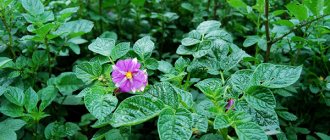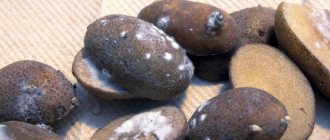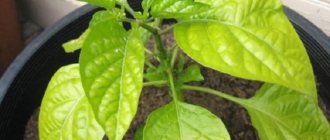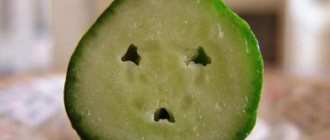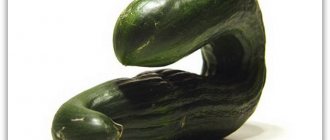Vegetable growing » Zucchini
0
605
Article rating
Kira Stoletova
Zucchini is a crop from the pumpkin family that can often be found in garden plots. It is often used to prepare various dishes. Sometimes you come across fruits with an unpleasant taste. Not all lovers of this vegetable know why bitter squash may appear among the harvest.
Causes of bitterness in zucchini
What gives zucchini its bitterness?
The main reason why zucchini tastes bitter is because it contains cucurbitacins. These substances accumulate in all crops belonging to the pumpkin family . Basically, a plant crop begins to actively accumulate such substances when extreme conditions are formed, for example: with a lack or excessive amount of water or nutrients. Also, a change in the quality of zucchini and the appearance of a bitter taste may be due to damage to the plant by various pathologies and growth in low light conditions.
Cucurbitacins are not toxic substances. Interestingly, they are even useful. These substances have a targeted effect against tumors and parasites. Due to these properties, cucurbitacins are used in traditional Indian and Chinese medicine.
Despite this, if zucchini is bitter, many summer residents are in no hurry to eat and serve them; in this case, you need to know in advance about the factors influencing the change in the taste of the vegetable in order to avoid their appearance.
Zucchini tastes bitter after frying
Zucchini resembles a pumpkin, but has a bush-like structure.
The fruits are characterized by an oblong shape, and there are no loops on the bushes. The description of the fruits indicates that they have different shades: from light green to rich yellow. The fruits can be consumed in any form. If you come across bitter squash, the crop lacks care. Reasons for the bitter taste of zucchini
Causes of bitterness
Bitterness in vegetables accumulates due to natural characteristics and is inherited. The appearance of an unpleasant taste is due to negative factors that must be dealt with immediately.
The risk of developing bitterness in zucchini is affected by poor quality care during the growth of this crop, so the farmer must first determine the cause and then fight it by establishing conditions for the development of the plant.
Insufficient watering
If you don't give the zucchini enough water during hot weather, it will become bitter. To preserve the pleasant and delicate taste of young fruits, you need to regularly and in sufficient quantities water the plants with warm water.
Humidification with cold water helps slow development. This leads to the risk of diseases and death of the bush. The optimal watering interval should be 3-4 days (if the weather is hot).
During the period of active rains, you will need to irrigate the beds once a week. Under each bush you need to pour so much water so that the soil is moistened to a depth of 30-40 cm.
Cross-pollination with other vegetables
If zucchini is bitter, this is often due to improper proximity to other crops. Each plant has its own growing season. During flowering, some crops release their pollen into the air.
If you plant onions, garlic or tomatoes next to zucchini, the pumpkin variety will constantly accumulate pollen from these vegetables. To reduce the risk of developing bitterness, planting should be done next to cabbage, carrots or potatoes. Only in this case can you avoid the appearance of an unpleasant taste in zucchini.
Excessive watering
As described above, insufficient watering contributes to the bitter taste of the pumpkin crop. If you moisten it too much, an unpleasant taste will also appear. It is forbidden to water plants so that moisture gets on the leaves. Exposure to the sun increases the likelihood of developing a bitter and astringent taste.
You should not water zucchini abundantly in cold weather, because... During this time they are exposed to many parasites and diseases. Humidification with cold water is not absorbed at all, which is why problems arise with development and resistance to weather conditions.
Lack of light
Zucchini becomes bitter if it doesn't get enough sun. The main reasons for this are considered:
- dense plantings or excessive proximity to other crops;
- overcast weather;
- the season when the day is shorter than the night;
- shade from trees.
To avoid such a problem, you need to adhere to the correct planting pattern. Sow seedlings in open ground at a distance of 1 m. Over time, when the bushes grow, they will not create shade for each other.
Choose areas for planting that are located on the south side. This way the crop will be exposed to sunlight for more time. Mature bushes need to be pruned regularly. Every month you need to remove excess foliage to allow light to penetrate the inside of the bush.
Excess fertilizer
The importance of nutrients for pumpkin crops cannot be overstated. The amount of fertilizer should not exceed the specified measures, because this causes bitterness in the squash. Excess potassium and phosphorus negatively affects the taste of fruits.
Sometimes fertilizers are harmful
To ensure that excess nutrients do not interfere with the taste of the fruit, it is necessary to normalize the process of fertilizing:
- a few weeks before planting, when forming holes, add 1 kg of humus to each hole;
- at the moment the ovaries form, you need to water the plants with a phosphorus solution (30 g per 5 liters of water);
- when the bushes bloom, they are fed with a 3% potassium solution (30 g per 10 liters of water);
- 3 weeks before harvesting, you will need to add a nitrogen solution to the root (50 g per 6 liters of water).
Improper storage
The description of the crop indicates that it is allowed to store ripe fruits for no more than six months. If this period is increased, the vegetables will not receive enough oxygen, especially if you keep the vegetables in the basement. It is better to place them on the balcony, which will need to be ventilated regularly.
During long-term storage, the taste of the fruit changes and bitterness appears. Remember not to eat overripe zucchini that has an unpleasant taste.
Accumulation of cucurbitacin
Cucurbitacin is the substance that makes squash bitter. A peculiarity of pumpkin crops (zucchini, pumpkins) is that the accumulation of cucurbitacin is due to natural phenomena and the genetics of vegetables, but it can also be detected in fruits if they receive poor watering.
Source: https://ingener-pto.ru/2019/12/12/kabachok-gorchit-posle-zharki/
Neighborhood of cultures
In most cases, bitter zucchini grows in the garden when the wrong neighboring plant crops are located near them. Bitterness occurs due to cross-pollination of related plants. So, zucchini tastes bitter if it was grown near a decorative pumpkin. Despite its beautiful attractive appearance, it bears fruit with inedible pumpkins, which affect the squash’s taste. Also, the crop may taste bitter if it was grown near the following plants:
- parsley;
- radishes;
- tomatoes;
- cucumbers;
- potatoes;
- radish;
- pumpkins.
To avoid changes in the taste of the vegetable, it should be planted in beds located close to peas, onions, spinach, and bush beans.
How bitter zucchini affects the body
After you have learned about the true causes of bitterness, it makes sense to consider the effect of such zucchini on the human body. After all, they are used not only by adults, but also by children and the elderly.
- Cucurbitacin has an irritating effect. It negatively affects the mucous membranes of the nasopharynx and oral cavity.
- This substance accumulates in the body if bitter zucchini is consumed regularly. Subsequently, you can develop gastritis or gastric and duodenal ulcers.
- Cucurbitacin becomes toxic when the concentration increases. It contributes to severe poisoning, nausea, vomiting, dizziness and loose stools.
- Due to their mild irritant effect, these compounds enhance the activity of the secretory glands. Experts say that all this has a positive effect on the bronchi and promotes the discharge of sputum.
To eliminate bitterness from zucchini, it would be useful to find out the cause of such trouble. From here you can conclude how beneficial the vegetable is for the body. After this, try to get rid of the unpleasant taste using any of the described methods.
Watering mode
In addition to the wrong neighbors, other growing conditions can also affect the taste of zucchini. Among them are the provision of improper watering. If a summer resident moistens the soil without adhering to a certain regime, nitrogen compounds begin to accumulate in the leaves and fruits of the vegetable, giving them a bitter taste. Also, bitter zucchini can grow during prolonged rain that begins after a drought.
See also
A diagram of how to shape and pinch zucchini in open groundRead
You can preserve the taste of the vegetable, as well as its beneficial properties, by properly watering the crop. To do this, you must follow the rules:
- watering should be carried out regularly;
- for irrigation it is necessary to use water that has stood in the sun, and it should not be contaminated;
- Young zucchini are watered so that they do not become bitter every day until the leaves close, and after they cover the ground, the amount of moisture introduced is reduced.
If the weather is hot, the plant crop should be watered after 2–3 days. If it is cloudy outside, one watering will be required every 5-6 days. The liquid should be poured under the root; it is not recommended to irrigate the foliage. If the greens begin to wither, they need to be watered using a watering can. You can replace it with a hose by putting a fine-mesh nozzle on it.
Why zucchini tastes bitter - reasons:
Due to unfavorable development conditions, zucchini can accumulate cucurbitacin or nitrogen compounds in large quantities, which cause a bitter taste in vegetables. The reasons are different: from fruit damage to diseases to excess or deficiency of essential microelements.
Diseases
Fusarium wilt is considered one of the most likely causes of a bitter taste. Signs of this disease include yellowing and drying processes that begin on the leaf blades and gradually move to the base of the stem.
Also, a fungal infection in the pulp of the fruit can form due to anthracnose. Manifestations of the disease are round spots on the leaves with a yellowish tint. After drying, they “fall out” and holes appear in the leaves.
As for what to do in such situations: to treat the lesion, you need to spray the plant with fungicidal agents. The use of sulfur powder is also allowed.
Excess fertilizer
Zucchini is bitter - it’s worth checking the fertilizer used. It is not uncommon for its excess to act as a factor provoking bitterness in the fruit.
There is a high probability of unpleasant taste characteristics of vegetables among gardeners who use natural fertilizers:
- compost;
- humus;
- animal droppings.
Their content is characterized by a high amount of nitrogen compounds, as well as potassium and magnesium, which contribute to the appearance of bitterness.
Incorrect watering mode
The accumulation of cucurbitacin can also be caused by ignoring the rules of the watering regime. If the owner of a garden plot decides, after a long drought, to moisten the soil as much and quickly as possible, the result of his activity will lead to the accumulation of nitrogen compounds in the fruits and a bitter taste of the pulp.
Young zucchini should be watered regularly, in this case using soft and warm water. Before the foliage closes, it is recommended to moisten the soil every day. After covering the soil with leaf plates, the number of waterings should be reduced.
If the fruits are already mature, then in hot weather it is enough to use this procedure once every 3 days. If it remains cloudy outside for a long time - once every 5 days. In this case, watering should be done at the root of the plant, and not on the leaf surface.
If it was not possible to preserve the zucchini greens from the heat, they begin to gradually fade; moisturizing should be done using a watering can or hose with an appropriate nozzle.
See also Description, characteristics and cultivation of Kavili zucchini
Accumulation of cucurbitacin
If the zucchini grows bitter, then there is an excessive accumulation of cucurbitacin. Such a consequence can occur not only due to too much fertilizing or ignoring watering rules. The proximity of other plants or problems with the soil for planting also matter.
Not only being in the shade, but also too much sunlight can affect the volume of the connection. It is formed both during growth and during improper collection or subsequent storage.
Therefore, it is worth choosing those varieties that are least susceptible to the accumulation of cucurbitacin.
Cross-pollination with other vegetables
In the process of determining the reasons why zucchini is bitter, you need to pay attention to their neighbors in the garden. A common factor in the development of such taste sensations is cross-pollination with other representatives of the flora.
Thus, it is not recommended to plant a decorative pumpkin nearby, which, although it has beautiful, but completely inedible fruits. During the ovary process, pollen is exchanged, which ultimately negatively affects the zucchini.
Also, to preserve the taste, the plant should be planted away from:
- any varieties of pumpkin;
- potatoes;
- radishes;
- tomato;
- cucumbers;
- parsley
Recommended neighbors: peas, spinach and onions - next to them zucchini can grow without unnecessary difficulties.
Too shaded area
The taste characteristics of the fruit are also affected by the duration of exposure to sunlight - the shorter it is, the greater the likelihood of provoking the production of cucurbitacin in excessive amounts.
Therefore, you should try to plant zucchini in well-lit areas of the garden area, where they will be in the sun most of the time, and not in the shade. In addition, it is recommended to periodically thin out the plantings to prevent the occurrence of a natural barrier to light from the plants themselves.
Weeds
In addition to the reasons associated with improper cultivation of zucchini, the proximity of weeds can also be a factor in the development of a bitter taste in the fruit pulp. For example, if wormwood grows on the site, there is a high probability of developing unpleasant taste sensations in the vegetable.
This consequence can be prevented by timely removal of weeds.
Storage errors
If the taste of bitterness in the zucchini appears after they have been transferred to storage areas, the owner is advised to pay attention to the compliance of the harvest conditions with the standards. The rules are:
- young vegetables that were collected in a state of “milk” ripeness can be stored for two weeks at a temperature range from 0 to 2 degrees. If the timing is violated, the flesh of the fruit begins to coarse and rot;
- adult zucchini retains its taste characteristics for 4-5 months. To ensure that the qualities of the fruit can be used for as long as possible, they should be placed in a cool, well-ventilated place;
- a basement or cellar is not the best option. Due to the lack of a constant flow of fresh air, rotting processes begin to develop;
- if the storage option can only be realized in a city apartment, then an insulated balcony or a dark corner of the home will do.
Beginning gardeners need to take into account the fact that excessive humidity and high environmental temperatures can provoke the appearance of seeds inside an already ripe fruit. Because of this, the pulp becomes bitter in taste.
See also: Planting and caring for zucchini from sowing to harvesting
Lighting and rules for feeding zucchini
Another reason why zucchini can be bitter is improper feeding of the plant, as well as the lack of optimal lighting conditions. Zucchini is very sensitive to light, so to grow it you need to choose a place in your dacha that is located on the sunny side. At the same time, the selected area should be free of drafts and strong winds. Also, fruits can react sharply to shortening daylight hours.
In addition to lighting, zucchini also needs to be provided with proper fertilizing. In this case, fertilizers should be applied throughout the entire growing season. The plant crop responds best to the addition of organic matter. When zucchini are fed in this manner, they form large fruits and actively develop.
As a fertilizer, it is recommended to use mullein diluted with water, as well as a three-day fermented herbal infusion. When the plant begins to form ovaries, it is recommended to add superphosphate and wood ash to the fertilizer. Care must also be taken when applying fertilizer. This is due to the fact that an excess of phosphorus and potassium can also cause changes in the taste of the vegetable.
Storage conditions for zucchini
Sometimes the taste of zucchini changes after harvesting. To avoid this, you need to know how to properly store the harvest. Storage of milk-ripe zucchini should be carried out at temperatures of 0–2 degrees. In this case, the shelf life of the vegetable is 12–15 days. If you store the crop longer, you need to be prepared for the pulp to wither and rot to appear.
Fully ripened fruits can be stored for 4–5 months. They need to be placed in a cool, ventilated room. The best option is to place the crop on the veranda or attic. To eliminate the risk of a bitter taste, as well as the spread of rot, the crop should not be stored in the cellar.
See also
Description of the Kavili zucchini variety, cultivation characteristics and yieldRead
If a summer resident lives in an apartment, you can put the harvest on a warm balcony or in a dark place. Zucchini retains its taste best under the bed, in the closet.
During storage, pay attention to the ambient temperature. This is due to the fact that when it increases, earlier germination of seeds inside the fruit occurs, which provokes the appearance of a nasty bitter taste.
Why is zucchini bitter after cooking and can it be eaten?
Squash is a type of pumpkin crop. Dishes with zucchini are tasty and healthy. This product is easy to prepare. Subject to any type of heat treatment. Sometimes the fruits have an unpleasant bitterness, like wormwood. It’s worth understanding why bitter zucchini grows.
Why are vegetables bitter?
According to experts, the appearance of bitterness is a consequence of the production of large amounts of curcubitacin. The substance is widely distributed in nature. It is also observed in other vegetable crops. Contained in different parts of plants - leaves, flowers, roots, fruits. Its content is the main cause of the unpleasant taste.
The substance accumulates in all crops that belong to the pumpkin family. The main reason for the accumulation is considered to be improper cultivation and care during ripening.
Reasons for appearance
The substance may be found in plants or soil. Its accumulation by zucchini depends on the variety. Some of them practically do not accumulate bitterness.
Curcubitacin is produced during cultivation and subsequent improper storage. If the rules of watering and the use of fertilizers were not taken into account during cultivation, then the likelihood of getting a tasteless harvest increases.
Accumulation of curcubitacin
It can occur not only due to improper watering or excess fertilizer. This can occur when the soil is unsuitable for growing this crop. It may be worth changing the growing location.
A likely reason for the accumulation of the substance is the presence or absence of certain plants nearby. Thanks to these some plants, the vegetable becomes more useful or more harmful.
The possibility of the appearance of curcubitacin occurs not only in the absence of sunlight, but also in its excess. Excessive light promotes its production. One way or another, this substance is an element of protection against adverse conditions.
A sharp change in temperature contributes to the development of bitterness. Cold weather after a long drought, or sudden heat after heavy rains. Curcubitin can appear not only during growth, but also due to improper harvesting. This means that you need to pick the fruit not at the root, but leaving the stalk behind. It is important not to damage the plant’s vines when collecting, or to touch the peel.
Plant disease
The taste reflects the presence of diseases or parasites on the plant. During cultivation, prevention from the occurrence of diseases and timely treatment against pests are necessary.
The most dangerous can be fungal diseases, which are considered difficult to prevent and eliminate. When spreading, a pronounced sign is damage to the stems and a change in color.
A disease such as anthracnose is widespread. When present, yellowish spots appear on the leaves. Over time they completely wither.
Another common disease is fusarium. With it, the stems have a pinkish tint, and the lower leaves become yellow.
Infectious plant diseases spoil the taste. If infections are present, it is necessary to begin treatment with specialized fertilizers. If treatment does not help, the crop must be destroyed.
Bitter vegetables - can you eat them?
Curcubitin has a bitter taste, like wormwood. Irritates mucous membranes. Accumulates in the body, which can gradually lead to diseases such as gastritis or ulcers. This is a toxic substance that, in excess, will cause symptoms of poisoning in humans. Nausea, vomiting and dizziness may occur.
Curcubitacin is used in traditional medicine against helminths and for the treatment of tumors. It is considered beneficial for the bronchi. Removes phlegm. Cleanses blood vessels and is used to prevent anemia. Strengthens the effect of antibiotics.
That is, you can eat zucchini in small quantities, but you need to take into account that wormwood in small quantities can be a medicine, but in large quantities it can be a deadly poison.
So it’s better to throw away bitter zucchini and not risk your health.
How to remove bitter taste
Attention - it is better to throw away bitter zucchini, take note of the following tips, but it is better not to risk it and eat regular, non-bitter zucchini. Anything that tastes bitter is usually poison.
There are several ways to get rid of the aftertaste. With proper processing, you can not only remove the unpleasant taste, but also prepare a variety of dishes.
Salty water. Soaking in salted water will help. To do this, just cut the fruits into small pieces and add water, adding salt before doing this. Salt will need 2 tablespoons per 900 milliliters. You can crush it with pressure.
Soaking time is 30 minutes, or a little longer. After aging, the pieces should be washed and dried. After this, you can start cooking.
Salting the dish costs a little less than usual, since the fruit absorbs some of the salt while it is in the salt solution.
Sprinkle with salt. Cut the zucchini and place in a colander. Sprinkle salt on top. Salt will promote the release of juice, and the bitterness will go away along with it. You can leave the sprinkled zucchini for a couple of hours. After this, the slices must be thoroughly rinsed and dried. Next you can cook.
Sour cream. If the bitterness is not strong, you can pour sour cream marinade over the sliced squash. This will give a delicate taste to the dish and mask the unpleasant aftertaste.
Cooking. Boiling zucchini in boiling water for a few minutes will help remove curcubitacin. This will help remove the unpleasant bitterness.
By using any of these techniques, the unpleasant aftertaste may disappear. The beneficial properties of the fruit are preserved, and it can make a tasty dish (or maybe even dangerous if the toxic substance remains in the vegetable).
How to avoid bitterness during storage
Overripe zucchini should not be collected for storage. When collecting, do not touch the stalk. Collect carefully, without damaging the peel. To prevent bitterness from appearing during storage, you can use several techniques that will help keep the fruits tasty.
You need to store the fruits in a refrigerator, a ventilated area, or a veranda. Shelf life is possible up to six months. Then the seeds may begin to sprout, which will lead to the appearance of bitterness.
A good way is to store it in the freezer. To do this, it is enough to remove the seeds from the fruits, after which the pulp must be cut and frozen. When frozen, bitterness will not appear only if it was not originally in the vegetable. If the zucchini was frozen bitter, it will remain so. During freezing, the beneficial properties are preserved.
If you plan to make preparations, it is better to prepare the vegetables for this procedure in advance.
Which variety is less bitter?
Not every variety is susceptible to curcubitacin accumulation.
“Tsukesh” is considered the most accumulated, bitter variety.
“Gribovsky” is the most averse variety to acquire unpleasant taste qualities. It is likely that it will grow tasty even under the most extreme conditions for it.
“Zolotnik” is sensitive to the growing process and is able to begin to accumulate curcubitin with the most minimal deviation from the norm.
“Skvorushka” is one of the most popular squash varieties. Well suited for preparing everyone's favorite caviar and salads.
"Pharaoh" has a pleasant sweetish taste. Subject to any type of processing.
“Chuklun” has delicate flesh and a pleasant, pronounced aroma. Can be stored for a long period of time. Suitable for preparing all dishes, any heat treatment.
If the vegetable is bitter
Zucchini acquires an unpleasant bitterness not only during cultivation or storage. In addition to these reasons, it may appear during cooking.
What to do if you come across a bitter vegetable? It is recommended to throw it away, or, as a last resort, to properly prepare and process it. After this, you can cook it as food, but it is better not to preserve it. The fruits will retain their beneficial properties, but consuming bitter vegetables is a significant health risk.
It is important to know the cause of the unpleasant taste. If the cause is an infection, the fruits must be disposed of (do not compost them). Treatments will not help, the product is unfit for consumption.
Bitterness after cooking
After cooking with this product, there is a possibility of getting an unpleasant surprise in the form of bitterness. Before eating, be sure to check the zucchini for any unpleasant taste. If there is one, the vegetable is thrown away or processed. If the vegetable was normal, but the dish was bitter, perhaps the problem is not the zucchini.
After cooking, you can notice that the zucchini has become bitter, although initially this taste was not observed. It is likely that the issue may be in other available components.
Fried zucchini has an unpleasant aftertaste due to the presence of rancid oil. Some varieties of sunflower oil have this property. This affects the taste of the product because it is able to absorb a lot of liquid.
An unpleasant aftertaste appears due to the presence of hot pepper. Even a small amount of hot pepper will add bitterness and spiciness to the entire dish.
The main benefit of bitter squash is the presence of curcubitacin. It appears during the growth, ripening and further storage of the vegetable. If the zucchini is bitter, it needs to be thrown away; it is not recommended, but it can also be processed.
Proper processing will get rid of the taste (still, eating bitter vegetables is a health risk). Some varieties are more prone to accumulating bitterness, some less so.
To get tasty fruits, you need to carefully monitor their growth process, follow the rules of care and storage of the product, which will help you get a tasty harvest.
Source: https://otvetil.info/domovodstvo/gorchit-kabachok-posle-prigotovleniya.html
Zucchini diseases
Diseases and pests also affect the taste of zucchini. Therefore, when growing crops, it is necessary to prevent their occurrence. Most often, bitterness appears under the influence of fungal infections. Anthracnose is considered one of the most common pathologies. The presence of this disease can be recognized by the appearance of round spots that have a yellowish-brown tint. These spots are located on the leaves.
Gradually, the leaf plate fades, dries out, and becomes covered with holes. The disease spreads in hot weather accompanied by frequent rains.
Another pathology that causes bitterness is fusarium. The disease can be identified by the presence of yellowing, drying lower leaves. Another symptom of fusarium is that the base of the stem turns pinkish.
How to get rid of bitterness?
What to do if bitter zucchini grows in the garden? To improve the situation and improve the taste of the vegetable, there are several proven methods. So, to get rid of bitterness:
- soaking zucchini in cold water before canning;
- boiling the vegetable in boiling water for several minutes;
- soaking sliced vegetables in salt water.
Under the influence of these factors, all bitter substances are destroyed, which is why the taste of zucchini improves. If the housewife wants to cook fried or stewed zucchini, it is best to get rid of the bitterness by soaking the pulp in salt water. The vegetable is cut into several slices and placed in a container with liquid for 3 hours. After this, the slices are removed and used to prepare the dish.
Many housewives recommend against re-salting dishes, since the vegetable pulp absorbs salt well from the liquid in which it was soaked.
When growing zucchini, you should carefully monitor the growth and development of the crop. This will help identify the factors why zucchini is bitter. Their timely elimination will allow you to cope with the deterioration of taste even before the problem arises and preserve a tasty harvest. If trouble does occur, the summer resident should not be upset, since there is an opportunity to save the harvest. To do this, you need to use one of the above methods.
How to remove bitterness from a finished dish. How to remove bitterness from eggplants before cooking?
Sometimes incorrectly chosen eggplants become bitter and spoil the taste of your favorite dishes. Why is this happening? Typically, bitterness is characteristic of overripe vegetables or those that lacked heat and moisture during ripening. But the bitterness of eggplants does not depend in any way on whether they are ground vegetables or greenhouse vegetables.
Photo: pixabay.com
To select non-bitter eggplants, when purchasing, choose small, unripe fruits with blunt noses. But if the subtleties of choosing vegetables are not within your competence and you come across bitter eggplants, you will definitely need one of our tips on how to remove bitterness from eggplants.
To prevent eggplants from becoming bitter...
Experienced housewives have long invented reliable ways to rid eggplants of bitterness:
- The easiest way is to cut off the skins of vegetables, which is where the bitterness is concentrated;
- Cut the vegetables into pieces, circles or strips (as required by the dish being prepared) and sprinkle them with salt, mix thoroughly so that all the eggplants are saturated with it. After 15 minutes, the eggplants should be thoroughly rinsed under running cold water and dried. The bitterness will go away with the juice released from the vegetables;
- The vast majority of housewives advise soaking eggplants to remove bitterness. To do this, you need to chop the fruits and pour plenty of salt water on them (at the rate of 2 tablespoons of salt per liter of water) for an hour (for finely or thinly chopped vegetables, half an hour will be enough). The fruits should be under pressure - then the efficiency of soaking will increase significantly. After the specified period of time, drain the water and dry the eggplants;
- Salt the eggplants, chopped as necessary, and cover them with a paper towel lightly moistened with milk. Press the towel onto the vegetables (you can use a cutting board as a priss), and after 15 minutes, remove it from the vegetables. The bitterness will be absorbed into the paper, and the eggplants will only have to dry;
- If using salt in the above tips doesn't work for you, the method of soaking eggplants in boiling water will come in handy. Vegetables need to be cut and pour boiling water over them for 5-10 minutes. Then the water is drained, the eggplants are dried - the bitterness is gone!
- If you need whole vegetables to prepare a dish, for example, stuffed eggplant, you can put them in a saucepan of boiling salted water. To prevent eggplants from becoming bitter, only 2-3 minutes of this procedure will be enough;
- Another way to remove bitterness from whole eggplants is to cut off the top and tip of the vegetable and alternately place it for half an hour in an upright position on a 1 cm thick layer of salt. After this, the eggplants should be thoroughly washed and dried.
How to remove the bitterness of an already cooked eggplant dish?
If you do not take care of removing the bitterness from the eggplants prematurely, the dish prepared from them may taste bitter. What should you do, should you throw it in the trash or make the whole family choke on a failed culinary experience?
Of course, it’s unlikely to change anything radically in the case of a ready-made dish. Try to overcome the bitterness with your favorite spices, herbs or hot sauce. Be sure to try your experiment in person before serving the dish to the public table.
